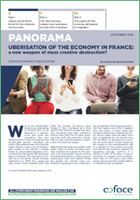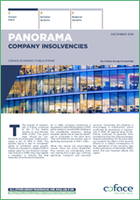“Uber-ization” in the French Economy: a Positive Impact on Employment but Will It Last?

- France is one of the leaders in collaborative economics in Europe, with more than 50 companies in this field
- Prior to 2012, the country saw a situation of near monopoly for taxis and the hotel industry in the Greater Paris region with only 4,000 additional taxi licences created in last 70 years and a deficit of 7,000 hotel rooms in Paris
- After the arrival of Uber and Airbnb, the Parisian hotel occupancy rate remained stable until the recent attacks, and45,000 private hire vehicles have been created in France
Taxi Company Insolvencies Are Offset by the Creation of Private Hire Vehicles in the Greater Paris Region
Taxi company insolvencies in France increased by nearly 60% in one year, rising from 141 cases in August 2015, to 224 at the end of August 2016 and resulting in the loss of 3.38 jobs on average. In the Greater Parisian region, taxi company insolvencies rose by 135% between 2013 and 2016, representing a quarter of total taxi insolvencies in France. Contrastingly, the creation of private hire vehicles has multiplied by seven since 2013, to reach 14,404 entrepreneurs by the end of August 2016 and generating 12,964 jobs. The Greater Paris region has experienced the highest rise in creations and accounting for 78% of private hire vehicle creations in France as of August 2016.
The Paris Attacks Helped Create the Rift between the Traditional Hotel Sector and Airbnb
Despite the arrival of Airbnb in the French capital in 2012, insolvencies in the hotel sector fell sharply between 2012 and 2014, by 58%. As the supply of hotel rooms in Paris was inadequate, this extra supply only served to fill the void.
However, in 2015, this dynamic began to reverse and company insolvencies in the sector experienced a sharp increase of 117%. The terrorist attacks at the start and the end of the year crippled hotel stays in Paris, which fell by around 5 points between June 2015 and June 2016, although air traffic increased by 3% over the same period. Airbnb has certainly captured a percentage of this difference, with the number of Airbnb rooms doubling in one year, to exceed 55,000 as of the end of August 2016.
To counter this pressure on the traditional hotel sector, the government plans to put stricter controls on these hubs. Potential measures include the taxation of additional revenues of for-hire companies, limitations on the number of days a main residence can be rented out, and the harmonization between access conditions for private hire vehicles and the taxi regulations.
A 20% Fall in the Supply of Private Hire Vehicles Could Push the Unemployment Rate up by 0.15 Points
The new regulatory framework aims, amongst other things, to reduce the supply of private hire vehicles. But this could have a negative impact on employment in the Greater Paris region.
In order to determine if these reforms are favorable or harmful to the real economy, Coface created a model that explains the consequences on the unemployment rate if private hire vehicles were to be removed from the Greater Paris region.
If we take into account the life-cycle of traditional taxi companies, the analysis shows that a 20% drop in the supply of private hire vehicles would result in an increase in the unemployment rate of 0.15 points. The more this supply falls, the greater unemployment levels would rise.
French Company Insolvency Rates: a Further Fall in 2017
The upcoming presidential elections in April and May 2017 are causing uncertainty among French entrepreneurs. They could well delay investment decisions until later in 2017. This safeguarding of investment capital will, at least, have the merit of being beneficial for companies in the short term. This year has shown some good signs and Coface forecasts a fall in insolvencies of -3.8% for 2016, followed by a further reduction of -1% in 2017.
In Q3 2016, 58,970 company insolvencies were recorded - a fall of 1% over one year. Conversely, the costs concerned (up 2%, to €3.78 billion) and number of jobs lost as a result (up by 1.4%, or around 186,000 people) have increased over one year. This trend reflects the increasing average size of insolvent companies, which have risen by +1.2%, with an average turnover of €543,000. This trend is palpable in the metals sector, where the average size of insolvent companies has increased by 25%.
At the same time, companies are more solid. The average age of an insolvent company has risen to 79.75 months, the highest since 2011. This is due to favorable financing conditions and healthy profit margins, with 31.6% forecast for 2017.
Finally, the three sectors that stand out most this quarter in terms of insolvencies are:
- Textiles-clothing has seen the greatest hike in insolvencies at +15.5% over one year. This sector has been affected by increased competition from the giants such as Inditex and by internet sales.
- In the food-processing sector, butchers and bakers have suffered from the stagnation in private consumption over the last two quarters.
- The transportation sector has been weakened by the rise in taxi insolvencies.
Download the Publication
- Origins of this french fervor for the collaborative economy
- This new economy creates more businesses and jobs than it destroys
- The outlook for this economy will depend on regulation
- Overall trend
- Sectorial dynamic
- Regional dynamic
Contact
Annie Lorenzana
COMMUNICATIONS MANAGER
North America
MOB: +1 (407) 221-3496
Annie.Lorenzana@coface.com










